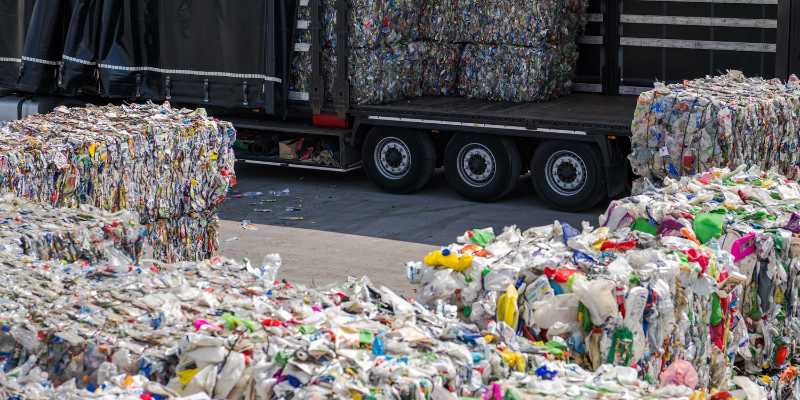Your big green bin - what happens next?

Two Re-Betchworth groups visited the Materials Recovery Facility (MRF) in Leatherhead, where our Mole Valley green bin contents are sorted. Arranged by the Parish Council, local residents got the chance to see behind the scenes. Ed Winter reports back.
The facility is run by family-owned company, Grundon Waste Management. Established almost 100 years ago, they specialise in a wide range of waste management and environmental services. While the Leatherhead building belongs to Mole Valley District Council, Grundon owns the equipment and operation where they process recycling collected from residents in Mole Valley, Elmbridge, Spelthorne and Woking. Alec Powell, Grundon’s General Manager, showed us around, providing an excellent and very informative tour.
We were pleased and surprised to find that 86% of the recycling waste collected actually does get recycled. The remaining 14% is sent to an energy reclamation unit where it is burnt to provide power. The end products from the Leatherhead facility are aluminium, steel, paper, cardboard and three types of plastic. Apart from paper, which is occasionally reprocessed in Europe, everything else gets reprocessed in the UK.
Here's some guidance we were given to help us all recycle effectively:
-
glass – tops, lids, labels can all be left on. Lids and tops are separated during the Leatherhead processing and labels come off during glass reprocessing.
-
cardboard - there’s no need to remove Sellotape and parcel tape; these separate during reprocessing.
-
plastics – don’t recycle plastic trays that have been used for meat, processed meals etc. Just put these in your black bin. Our understanding is that plastic meat/food trays are acceptable if rinsed. The real issue is with heavily soiled items, or worse still, containers or bags of waste food, which could contaminate the product. This can lead to rejection at the end user site with all the business implications that entails.
-
Pizza boxes - or any wrappings with food must be put in the black bin. Do not send waste that contains any food stuffs for recycling. This creates environmental hazards at the recycling plant eg from rats and insects etc.
-
Tetrapac - cannot be recycled at most recycling plants such as Leatherhead. There are only two facilities in the world which can recycle Tetrapac, one in the UK and one in Spain. The local collection site for Betchworth is in Dorking.
-
Clear Plastic Wrappings and Cellophanes - The Leatherhead site does not currently process these high value products. As with other waste types these should be rinsed and taken to collection points eg Waitrose.
Most of the process at Leatherhead is automated, involving large conveyors and technologies employed to separate papers and cans, eg air lines to blow paper, magnets for cans. Newer technologies using cameras are being developed, which will eventually lead to future AI adaptations to separate out the various items. At the moment, the final process where the remaining recycling travels along a moving belt, relies on people visually scanning and picking out items.
Overall, a very impressive process from start to finish. One fascinating fact emerged when we discussed changes within recycling with our tour leader, Alec Powell. Although newsprint has decreased considerably, as people moved to online newspapers and magazines, rest assured, within Mole Valley wine bottles are holding up well!